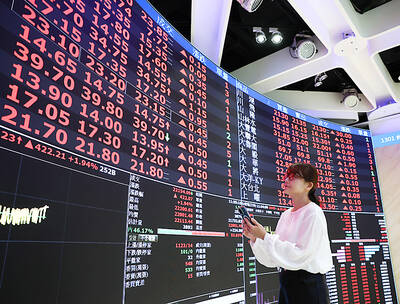Acer Inc announced yesterday that Sung Hsueh-jen (宋學仁) will join its board of directors as a representative of Hung Rouan Investment Corp (宏榮投資公司). It expects his appointment to enhance Acer’s profile among international investors, a company statement said yesterday.
Acer’s seven-member board of directors also includes Wang Jen-tang (王振堂), Stan Shih (施振榮), Gianfranco Lanci, Walter Deppeler, Philip Peng (彭錦彬) of Smart Capital Corp (智星公司) and Lin Hsin-yi (林信義), former chairman of the Industrial Technology Research Institute (工業技術研究院).
“This is great news for Acer. Sung is an expert in this field and he understands the business inside and out” said Kuo Chung-chien (郭仲乾), executive vice president of Waterland Securities Co (國票證券) via telephone yesterday.
“Sung was the force behind taking Acer public on the US stock exchange via an ADR issue [American Depository Receipts]. Since then Sung’s client roster has included Hon Hai Precision Industrial Co (鴻海) and ASE Global (日月光),” he said.
Acer is the third largest computer manufacturer in the world, behind Hewlett-Packard and Dell Inc.
Stan Shih’s wife, Carolyn Yeh (葉紫華), is behind Hung Rouan Investment Corp.
Sung is currently vice chairman of Goldman Sachs Asia and also an advisory director. Sung joined Goldman Sachs in 1994. He has served in various top positions within the investment bank, first as an executive director in the investment banking division, then as a managing director in 1996.
He became a partner in the firm in 1998 and also served as co-head of corporate finance Asia-Pacific in 2003 and co-head of the Asia principal investment area in 2005.
Prior to joining Goldman Sachs, Sung worked for many years in the investment banking industry in Tokyo, London, Sydney and Hong Kong.
He holds an MBA from Harvard Graduate School of Business Administration, a masters from National Chengchi University, and a bachelor’s from National Chiaotung University.

UNCERTAINTIES: Exports surged 34.1% and private investment grew 7.03% to outpace expectations in the first half, although US tariffs could stall momentum The Chung-Hua Institution for Economic Research (CIER, 中華經濟研究院) yesterday raised its GDP growth forecast to 3.05 percent this year on a robust first-half performance, but warned that US tariff threats and external uncertainty could stall momentum in the second half of the year. “The first half proved exceptionally strong, allowing room for optimism,” CIER president Lien Hsien-ming (連賢明) said. “But the growth momentum may slow moving forward due to US tariffs.” The tariff threat poses definite downside risks, although the scale of the impact remains unclear given the unpredictability of US President Donald Trump’s policies, Lien said. Despite the headwinds, Taiwan is likely

READY TO BUY: Shortly after Nvidia announced the approval, Chinese firms scrambled to order the H20 GPUs, which the company must send to the US government for approval Nvidia Corp chief executive officer Jensen Huang (黃仁勳) late on Monday said the technology giant has won approval from US President Donald Trump’s administration to sell its advanced H20 graphics processing units (GPUs) used to develop artificial intelligence (AI) to China. The news came in a company blog post late on Monday and Huang also spoke about the coup on China’s state-run China Global Television Network in remarks shown on X. “The US government has assured Nvidia that licenses will be granted, and Nvidia hopes to start deliveries soon,” the post said. “Today, I’m announcing that the US government has approved for us

When Lika Megreladze was a child, life in her native western Georgian region of Guria revolved around tea. Her mother worked for decades as a scientist at the Soviet Union’s Institute of Tea and Subtropical Crops in the village of Anaseuli, Georgia, perfecting cultivation methods for a Georgian tea industry that supplied the bulk of the vast communist state’s brews. “When I was a child, this was only my mum’s workplace. Only later I realized that it was something big,” she said. Now, the institute lies abandoned. Yellowed papers are strewn around its decaying corridors, and a statue of Soviet founder Vladimir Lenin

The National Stabilization Fund (NSF, 國安基金) is to continue supporting local shares, as uncertainties in international politics and the economy could affect Taiwanese industries’ global deployment and corporate profits, as well as affect stock movement and investor confidence, the Ministry of Finance said in a statement yesterday. The NT$500 billion (US$17.1 billion) fund would remain active in the stock market as the US’ tariff measures have not yet been fully finalized, which would drive international capital flows and global supply chain restructuring, the ministry said after the a meeting of the fund’s steering committee. Along with ongoing geopolitical risks and an unfavorable